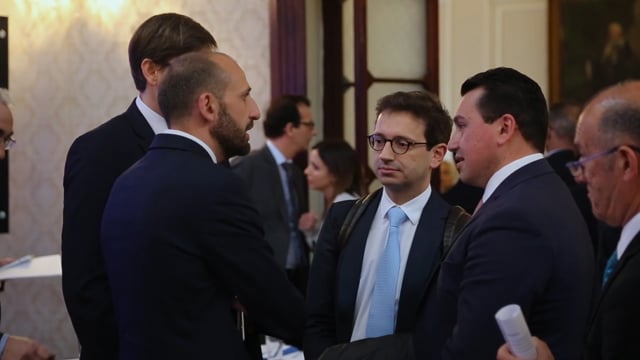
[WATCH] European Commission says Malta is a model for use of EU funds
EU funds parliamentary secretary Aaron Farrugia says investment with EU funds has been a key contributor to Malta’s transformational change in recent years, and it is clear that this needs to be consolidated and sustained during the next funding period


Investment with EU funds has been a key contributor to Malta’s transformational change in recent years, and it is clear that this needs to be consolidated and sustained during the next funding period, EU funds parliamentary secretary Aaron Farrugia told European Commission representatives.
Last week the European Commission Representation in Malta hosted a presentation and discussion on Malta’s 2019 Country Report and 2021-2027 Cohesion Policy Funding in Malta. The very positive presentation on Cohesion Policy in our country was introduced by the Deputy Secretary General of the European Commission Celine Gauer, and presented by EC directors Rudolf Niessler and Stefan Olsson.
“It was very heartening to hear the European Commission praise our efforts when it comes to the use of European Union funds – as cohesion funds in particular have contributed greatly towards the development of member states and regions particularly in boosting their economic growth and competitiveness,” Farrugia said in reaction.
Malta is, in fact, the perfect example of this: EU investments are being directed towards a number of key areas including environmental sustainability, social well-being and a healthy society, whilst fostering competitiveness through economic development and job creation.
Just to mention a few examples: Malta’s new museum of art, MUZA is the first of its kind developed in a historic building that is green-powered and generates its energy from renewable resources.
The total investment for this project amounted to €8.7 million and represents an example of best practice in retro-fitting a historic building.
The new Oncology Centre annexed to Mater Dei Hospital for a total investment of just under €50 million, offers advanced diagnosis and treatment, and this project has tripled the number of beds available for cancer patients and offers numerous impatient services.
The regeneration of the lower part of Valletta, for a total amount of €24 million, will contribute towards the urban regeneration of the area through a multi-faceted approach that will address social, economic, physical and environmental needs and challenges of the area.
Investment in Malta’s main resource, human capital, is being supported heavily by the European Social Fund, which has enabled the participation of over 30,000 employees from the private sector in learning programmes through the ‘Training Aid Framework’ with the aim of enhancing their adaptability and increase their productivity. Similarly, through the ‘Investing in Skills’ scheme just over 5,400 employees have been trained so far.

“Looking ahead towards the future and therefore the Commission’s proposals for the 2021-2027 cohesion policy funding in Malta, we are assessing these proposals – also through initial reactions as part of this discussion. In this regard, we look forward to starting this discussion early with the European Commission in order to ensure that Malta will continue to improve in its trajectory of economic growth, increase in employment, environmental sustainability and social cohesion,” Farrugia said.
The parameters identified in the country report on EU funding are broadly in line with Government’s ambitions for cohesion policy 2021-2027 – but not entirely.
There are a number of issues which require further analysis, and where Malta’s intrinsic limitations in terms of small scale, capacity, geographical and socio-economic realities, amongst others, have not been sufficiently addressed.
Issues relating to the growth of enterprises, in particular small and micro enterprises; investments supporting cultural heritage sites; enhancing nature protection and biodiversity, promoting sustainable multimodal urban mobility, investments in education and health as well as the development of Gozo will certainly require further discussion.
In fact, Government has officially requested the European Commission to report to the European Council on the economic and social situation in Gozo.
But this is not the only time Malta’s efficient use of EU funds has been praised on EU-level: just a few days ago, European Commissioner Corina Cretu hailed Malta as a “benchmark” for many other countries when it comes to implementing EU-funded projects and initiatives.
“Malta should be praised for its efficient use of European funds”, the Commissioner said. “Three years after the start of the programming period, Malta has reached its financial targets. This means that the money that was committed is being used to the fullest and in a timely manner.”
Cretu also remarked positively on the fact that Malta has one of the highest project selection rates in the European Union. “These projects have contributed to improving the daily life of the people of Malta. Funds have been invested in education, re-skilling, sustainable transport, key infrastructure, but also in safeguarding borders and supporting businesses,”
The Commissioner said that all of these EU-funded projects have had an ‘undeniable impact’ on the country’s economic growth and sustainable development. “Malta can take the credit for these achievements which are of good omen for preparing the next programming period.”




